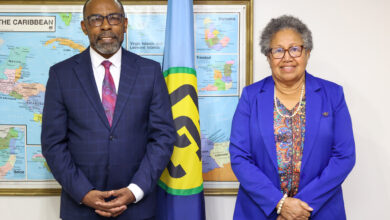Hon. Robert Persaud, Minister of Agriculture
Representatives of Member States
Representatives of Associate Members
Mr Hugh Saul and other colleagues of the CRFM
Representatives of Institutions
Staff of the CARICOM Secretariat
Ladies and Gentlemen of the Media
It gives me great pleasure to address this Second Special Meeting of the Caribbean Fisheries Forum on the Common Fisheries Policy and Regime for the Caribbean Community.
The fisheries resources in the Region represent a vital resource and play a critical role in providing nutrition for the local populations, as well as ensuring the livelihoods of fishing communities, substantial export earnings and food security. The last figures available for 2005 show that among the top five agricultural commodities of the Region, the exports of shrimps and prawns earned approximately EC$192.4 million, accounting for approximately 5.7% of the total domestic agricultural exports, outranking banana exports and being second only to sugar exports from the Region. There is, however, evidence to suggest that many of the fisheries are already being exploited close to their potential; hence the issue of sustainable use is high on the agenda of Community.
Fishery stakeholders and fishing authorities have therefore posited a common approach to the management of the fisheries of the Region. The Fourteenth Inter-Sessional Meeting of the Conference of Heads of Government which took place in 2003, in demonstration of its highest level of commitment by Governments of CARICOM Community, mandated the CARICOM Secretariat to pursue the establishment of a framework for the exploitation and conservation of fisheries resources in the Region based on stipulated guidelines. The Caribbean Regional Fisheries Mechanism (CRFM), formally inaugurated on 26 March 2003, was deemed to be capable of providing regional leadership with regard to this mandate of the Heads of Government.
It was agreed that the best strategy for execution of the mandate to develop a Common Fisheries Policy and Regime would be through the establishment of a working group comprising, but not limited to the following representatives: (i) Executive Committee of this Forum; (ii) CARICOM Secretariat; (iii) CRFM Secretariat; (iv) OECS Secretariat; (v) UWI; (vi) Member States Guyana and/or Suriname. Since that time, the articulation of the vision, framework and guidelines for a Common Fisheries Policy and Regime, have been proven to be a challenging work-in- progress, especially with respect to arriving at consensus and agreement on the varied and sensitive issues. Many sub-working groups have been constituted to address specific technical, legal, and socio-economic challenges in the formulation of a common fisheries policy and regime.
These working groups have explored and investigated, and sought to understand and interpret various international conventions and laws, including our own Revised Treaty of Chaguaramas and national legislation with respect to issues such as management of the fisheries resources; borders and zones; fishing rights; and control and monitoring mechanisms, in order to formulate an acceptable solution to some of the problems encountered in recommending a construct for a common fisheries policy and regime for the Community.
I am aware that the task has not been an easy one. However, there has been progress over the last four years with respect to many of the technical and socio-economic issues and there has even been agreement on some of the issues among the stakeholders. Some of the strategies employed by the working group had been to engage in national and regional consultations, the establishment of various expert and multidisciplinary sub-working groups to address the issues which surfaced in the progression of the development of the framework. Over the last two years the ad hoc legal working group and the socio-economic working group have been making substantial progress in addressing some particularly sensitive issues. The common fishing zone and the conditions of access to the fisheries resources therein have been among the sensitive issues for some Member States who are concerned about the sustainability of the resources and potential negative social and economic impacts on their local fishermen.
I anticipate that this Meeting will engage in earnest deliberation on some of these issues and bring forward workable recommendations toward the refinement of the draft Common Fisheries Policy and Regime for consideration by the COTED and, subsequently, the Conference of Heads Meeting.
In closing, let me take this opportunity to commend the efforts of the Working Group and all those officials and experts from the various government and non-governmental agencies and institutions who have worked earnestly and diligently to bring us this far. I wish you all a productive meeting.
Thank you.




